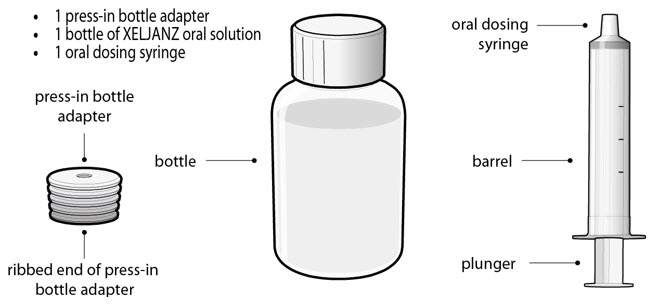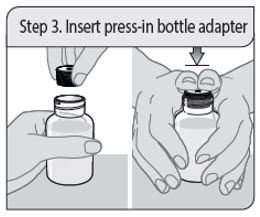For most of the drugs advantages of taking medications overweighs the potential risks however some drugs could be really dangerous for breastfed baby hence every medication shall be considered separately. In this page we will discuss about purpose of Xeljanz | Tofacitinib Tablet and its risk associated with lactation. We will also discuss the usage of Xeljanz | Tofacitinib Tablet and some common side effects associated with Xeljanz | Tofacitinib Tablet.
What is Xeljanz | Tofacitinib Tablet used for?
XELJANZ/XELJANZ XR is a Janus kinase (JAK) inhibitor. Rheumatoid Arthritis: XELJANZ/XELJANZ XR is indicated for the treatment of adult patients with moderately to severely active rheumatoid arthritis who have had an inadequate response or intolerance to methotrexate. It may be used as monotherapy or in combination with methotrexate or other nonbiologic disease-modifying antirheumatic drugs (DMARDs). Limitations of Use: Use of XELJANZ/XELJANZ XR in combination with biologic DMARDs or potent immunosuppressants such as azathioprine and cyclosporine is not recommended. (1) Psoriatic Arthritis: XELJANZ/XELJANZ XR is indicated for the treatment of adult patients with active psoriatic arthritis who have had an inadequate response or intolerance to methotrexate or other disease-modifying antirheumatic drugs (DMARDs). Limitations of Use: Use of XELJANZ/XELJANZ XR in combination with biologic DMARDs or potent immunosuppressants such as azathioprine and cyclosporine is not recommended. (1) Ulcerative Colitis: XELJANZ is indicated for the treatment of adult patients with moderately to severely active ulcerative colitis (UC), who have had an inadequate response or who are intolerant to TNF blockers. Limitations of Use: Use of XELJANZ in combination with biological therapies for UC or with potent immunosuppressants such as azathioprine and cyclosporine is not recommended. (1) Rheumatoid Arthritis XELJANZ/XELJANZ XR is indicated for the treatment of adult patients with moderately to severely active rheumatoid arthritis (RA) who have had an inadequate response or intolerance to methotrexate. It may be used as monotherapy or in combination with methotrexate or other nonbiologic disease-modifying antirheumatic drugs (DMARDs). Limitations of Use: Use of XELJANZ/XELJANZ XR in combination with biologic DMARDs or with potent immunosuppressants such as azathioprine and cyclosporine is not recommended. Psoriatic Arthritis XELJANZ/XELJANZ XR is indicated for the treatment of adult patients with active psoriatic arthritis (PsA) who have had an inadequate response or intolerance to methotrexate or other disease-modifying antirheumatic drugs (DMARDs). Limitations of Use: Use of XELJANZ/XELJANZ XR in combination with biologic DMARDs or with potent immunosuppressants such as azathioprine and cyclosporine is not recommended. Ulcerative Colitis XELJANZ is indicated for the treatment of adult patients with moderately to severely active ulcerative colitis (UC), who have an inadequate response or who are intolerant to TNF blockers. Limitations of Use: Use of XELJANZ in combination with biological therapies for UC or with potent immunosuppressants such as azathioprine and cyclosporine is not recommended.
I am breastfeeding mother and I am using Xeljanz | Tofacitinib Tablet. Can it have any bad effect on my kid? Shall I search for better alternative?
Xeljanz | Tofacitinib Tablet contains Tofacitinib as active ingredients, . We do not have safety rating of Tofacitinib but we do have analysis of Tofacitinib, which is used in manufacturing of Xeljanz | Tofacitinib Tablet. You can get a good idea about Xeljanz | Tofacitinib Tablet usage while breastfeeding by going through our detailed analysis as below.
Xeljanz | Tofacitinib Tablet Breastfeeding Analsys
CAS Number: 477600-75-2
No information is available on the clinical use of tofacitinib during breastfeeding. If tofacitinib is required by the mother, it is not a reason to discontinue breastfeeding.[1] However, until more data become available, tofacitinib should be used with caution during breastfeeding and an alternate drug may be preferred, especially while nursing a newborn or preterm infant.[2] The manufacturer recommends that breastfeeding be discontinued during tofacitinib therapy and for 18 hours after the last dose of Xeljanz or 36 hours after the last dose of Xeljanz XR.

What should I do if I am breastfeeding mother and I am already exposed to Xeljanz | Tofacitinib Tablet?
We are not completely sure about safety of Xeljanz | Tofacitinib Tablet in breastfeeding. We would suggest you to contact your doctor or health care provider and explain your situation with Xeljanz | Tofacitinib Tablet. If you observe anything abnormal with your baby please call 911 or contact emergency services in your area.
I am nursing mother and my doctor has suggested me to use Xeljanz | Tofacitinib Tablet, is it safe?
If your doctor considers Xeljanz | Tofacitinib Tablet safe enough to prescribe for you that means its benefits outweigh its known risks.
If I am using Xeljanz | Tofacitinib Tablet, will my baby need extra monitoring?
Not Sure, Please check with your doctor or lactation consultant.
Who can I talk to if I have questions about usage of Xeljanz | Tofacitinib Tablet in breastfeeding?
US
National Womens Health and Breastfeeding Helpline: 800-994-9662 (TDD 888-220-5446) 9 a.m. and 6 p.m. ET, Monday through Friday
UK
National Breastfeeding Helpline: 0300-100-0212 9.30am to 9.30pm, daily
Association of Breastfeeding Mothers: 0300-330-5453
La Leche League: 0345-120-2918
The Breastfeeding Network supporter line in Bengali and Sylheti: 0300-456-2421
National Childbirth Trust (NCT): 0300-330-0700
Australia
National Breastfeeding Helpline: 1800-686-268 24 hours a day, 7 days a week
Canada
Telehealth Ontario for breastfeeding: 1-866-797-0000 24 hours a day, 7 days a week


